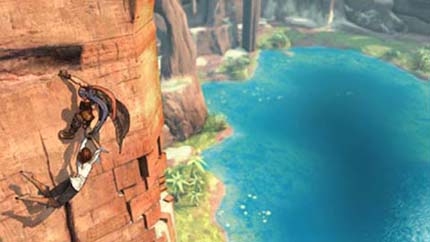
Prince of Persia was easily one of the most enigmatic games 2008. I’ve been poring over Michael Clarkson’s wonderful “Critical Thinking Compilation” at Discount Thoughts, and it seems this title has divided critics over everything from ease of play to its controversial ending. While it’s hard to imagine that I can actually add anything to the wealth of discussion this game has generated, I’d like to try connecting the two dots mentioned above.
Clarkson himself points out that the platforming in Prince of Persia “focuses on instinct and rhythm” in such a way as to “inspire a feeling of exhilarating freedom, an idea that you can go anywhere in this world.” He argues that the game’s design choices coerce players into identifying with the Prince and, honestly, it’s all quite convincing — the game mechanics clearly highlight the protagonist’s carefree attitude in a manner that overshadows difficulty. Acrobatically navigating the environment is a real joy, and part of this has to do with the unmistakable feeling of competence Prince of Persia engenders. With only a very little practice to learn the game’s cues, playing as the Prince becomes a fluid and almost effortless experience. But it’s completely dependent upon the princess.
Spoilers to follow.
SPOILER ALERT!!!
Elika, it seems safe to say, is hands-down the most interesting element of the game. Our Prince relies upon her completely; she uses her magical powers cooperatively to extend his range, complement his attacks, and (it must be said) to save his ass. In other words, she’s a huge part of what makes Prince of Persia worth playing. Which is why the Prince’s actions at the end of the game make so much sense. He wouldn’t want to go on without Elika there for him.
Perhaps more importantly, neither would the player. Steve Amodio of 8-bit Hacks takes this into account while examining the game’s final moments. Amodio asks, “With Elika gone, what’s left?” He indicates that the world you’re destroying to save the princess is little more than a broken playground without her in it.
What strikes me here is how forcefully Clarkson’s point begins to express itself. After Elika’s death, the designers allow us to momentarily experience the Prince as pauper. Suddenly, without the princess there to help, navigation has become an uncertain task. Moving from point to point is no longer a matter of having Elika fling you along. Consequently, what was decidedly not a puzzle-platformer begins to require elements of forethought and consideration. It doesn’t last long, but that quality of flowing, confident movement is gone, and the absence is poignant. The game’s tempo has been interrupted, and things simply don’t feel quite so fun.
Ubisoft Montreal brings players to a point where it just wouldn’t make sense to NOT do what the story requires of them. By revealing the limits of enjoyment, they persuade us to choose as the Prince would, effectively marrying narrative and interaction. It’s a bold move and a bit of a dirty trick, but it worked on me: for at least a moment, I felt some fraction of the Prince’s swirling emotions.
Tags: Prince of Persia, Ubisoft, Ubisoft Montreal
Leave a comment